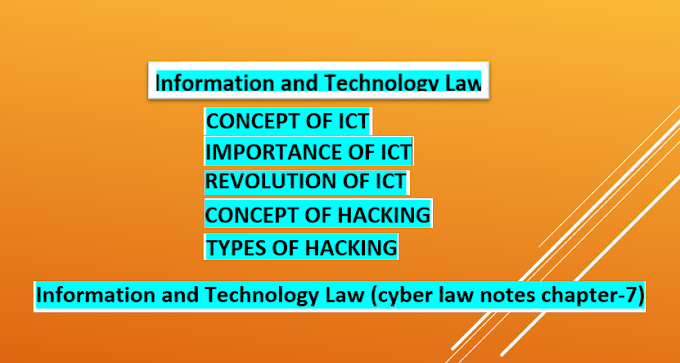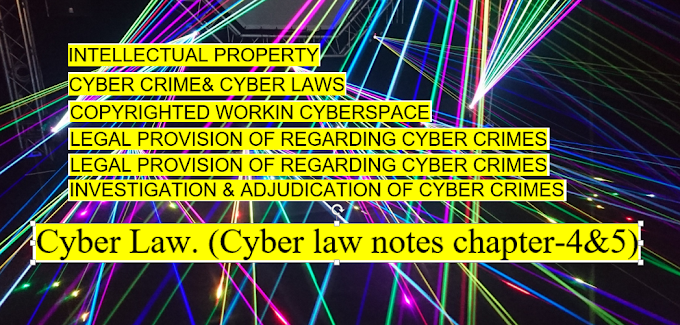Cyber law is the area of law that deals with
the Internet's relationship to technological and electronic elements, including
computers, software, hardware and information systems (IS).
Cyber law is the part of the overall legal
system that deals with the Internet, cyberspace, and their respective legal
issues. Cyber law covers a fairly broad area. encompassing several subtopics
including freedom of expression, access to and usage of the Internet, and
online privacy. Genericaliy, cyber law is referred to as the Law of the
Internet.
WHY ARE CYBER LAWS NEEDED?
Like any law, cyber law is created to help
protect people and organizations on the Internet from malicious people on the
Internet and help maintain order. If someone breaks a cyber law or rule, it
allows another person or organization to take action against that person or
have them sentenced to a punishment.
CYBER LAW ENCOMPASSES MANY DIFFERENT TYPES OF LAW
Cyber law serves a variety of purposes. Some
laws protect people from becoming the victims of crime through unscrupulous
activities on the internet. Other laws create rules for how individuals and
companies may use computers and the internet. These laws cover a wide range of
topics and activities, but they all fall under the wide category of cyber law.
The major areas of cyber law include:
· 1. Cyber Crimes
· 2. Electronic and
[Digital Signatures
· 3. Intellectual
Property
· 4. Data Protection and
Privacy
Copyright
The internet has made copyright violations easier. The early days of online Communication made copyright violations as easy as clicking a button on a file- sharing website. Both individuals and companies need attorneys to bring action to enforce copyright protections. Copyright infringement is an area of cyber lawn that defends the rights of individuals and companies to profit from their creative works.
Defamation
Many people use the internet to speak their
minds. When people use the internet to say things that are untrue, it can cross
the line into defamation. Defamation laws are civil laws that protect
individuals from untrue public statements that can hurt a business or someone's
personal reputation. Defamation law is cyber law when people use the internet
to make statements that violate civil laws.
Harassment and Stalking
Sometimes online statements can violate
criminal laws that prohibit harassment and stalking. When a person makes
repeated or threatening statements about Someone else online, they may violate
both civil and criminal laws. Cyber lawyers both prosecute and defend people
when stalking occurs using the internet and other forms of electronic
communication.
Freedom of Speech
An important area of cyber law is freedom of speech.
Even though cyber laws prohibit certain behaviors online, freedom of speech
laws also allows people to speak their minds. Cyber lawyers must advise their
clients on the limits of free speech including laws that prohibit obscenity. In
addition, cyber lawyers may defend their clients when there's a debate about
whether their actions constitute permissible free speech.
Trade secrets
Companies that do business online often rely on
cyber law to protect their trade secrets. For example, Google and other online
search engines spend a great deal of time developing the algorithms that
produce search results. They also spend a great deal of time developing other
features like maps, intelligent assistance, and flight search services to name
a few. Cyber lawyers help their clients take legal action as necessary in order
to protect their trade secrets.
SCOPE OF CYBER LAW
The rapid development of information technology
posed certain challenges for the law that are not confined to a particular
category of law but arises in diverse areas of law, such as criminal law,
intellectual property law, contract, and tort. The issues of free speech, and
intellectual property. safety. equity, privacy, e-commerce, and jurisdiction
are governed by the Cyber Law. The scope of different problems presented by the
advancement of technology includes:
ü A. Dealing with the
computer hackers or those who introduce viruses;
ü B. Categorization of
'contract for the acquisition of software' on similar
ü
footing with a
contract which dealing with goods;
ü C. Dealing with the
phenomenon of mass consumer purchases from other jurisdictions under
e-commerce;
ü D. Existence of
copyright in a computer program and question of patent protection
ü E. Question of the destruction
of copyright due to the widespread dissemination of text on the network.
ü F. Regulation of Cyber
Squatting' and trafficking in domain names under law
ü G. The question of
regulation of the content of material on the internet and freedom of information
and expression.
ü H. The protection of the privacy of the individual amid the increasing capacity for storing, gathering, and collating information.
WWHAT IS CYBERSPACE? Cyberspace refers to the virtual computer world, and more specifically, is an the electronic medium used to form a global computer network to facilitate online communication. It is a large computer network made up of many worldwide computer networks that employ TCP/IP protocol to aid in communication and data exchange activities.
Cyberspace's core feature is an interactive and
virtual environment for a broad range of participants.
Cyberspace allows users to share information. interact, swap ideas, play games, engage in discussions or social forums, conduct business, and create intuitive media, among many other activities. The term cyberspace was initially introduced by William Gibson in his [984 book. Neuromancer." Gibson criticized the term in later years, calling it evocative and essentially meaningless." Nevertheless,The term is still widely used to describe any facility or feature that is linked to the Internet.
CYBER TRANSECTIONS
An online transaction, also known as a
PIN-debit transaction, is a password- the protected payment method that
authorizes a transfer of funds over an electronic funds transfer (EFT)
How Does an Online Transaction Work?
When you pay for goods or services with your
debit card, you have an option for the payment to be processed in two different
ways: as an offline transaction via a credit card processing network, or as an
online transaction via an EFT system, requiring a personal identification
number (PIN) to complete the process.
When processed as an online transaction, the exchange of funds is completed using an EFT network, such as Star, Pulse, or Interlink, depending on which EFT system your bank is associated with as a member bank. The cost of the transaction typically amounts to an interchange fee of 1% of the total purchase price, which is charged to the vendor/merchant.
Why Does an Online Transaction Matter?
$20.5 billion in interchange fees were charged to merchants in 2010. Now they are at the center of debate among lawmakers, banks, and merchant unions in the U.S. On one side of the argument are the banks, which claim that interchange fees are necessary to cover the costs of processing transactions and providing fraud protection.
In July 2010, the Dodd-Frank Wall Street Reform and Consumer Protection Act was passed by Congress, and included in the Act was an amendment to address interchange fee reform (the Durbin Amendment). Under this Amendment, the Federal Reserve is now authorized to review and reform debit card transaction fees. One such proposal will cap interchange fees at $0.12 per transaction, a 73% reduction from the average charge of $0.44 per transaction. As a consequence, consumers can expect a loss of financial perks like free checking accounts, the end of rewards programs for debit cards, and an increase in fees for ATM withdrawals from out-of-network banks. If interchange fee reform is not passed,
CYBER JURISPRUDENCE
What is Jurisprudence of Cyber Law: Jurisprudence is the branch of philosophy concerned with the law. It is a legal philosophy. So Jurisprudence of cyber laws is the philosophy concerned with the Cyber laws and also the conventional law that is related to Cyber Crime. Cyber jurisprudence is still in its initial stage. Cyber Jurisprudence is a new legal philosophical concept. It is developing based on Information Technology & Networked world. A new problem arises on the emergent growth of technological issues based on cyber culture and civilization. The future war and peace, humanity and morality, life and enjoyment, society & individuality are almost going to cyberspace. To make all this under the legal framework is a vast philosophical aspect. So Cyber jurisprudence the philosophy of the cyber world, legal relationship with mankind.
Ethics of Cyber Jurisprudence:
Ethics is the motivation based on ideas of
right and wrong. It is the philosophical study of moral values and rules of
mankind and the principle of right & wrong that are accepted by an
individual or a social group.
The right to freedom of belief thought and
expression which are basic principles envisaged in the constitution. The
freedom of the press is also a guaranteed right provided by the constitution.
Further, the constitution also guarantees right to information. The citizens
have the fundamental right to know what is happening around them. The
constitution guarantees the right to privacy. The Supreme Court of Bangladesh
is the guardian of fundamental rights as confirmed by the constitution.
As a matter of principle, there is no doubt
that in conflicts between a personal- interest and national interest undoubtedly
the national interest should prevail. Further, there is a dire need for
evolving a code of ethics on the Cyberspace and discipline.
So ethics of Cyber Jurisprudence is a new
concept based on information Technology, Cyberspace. Cyber World. Internet
Nationality etc.
Importance of Cyber Jurisprudence:
Computer, Internet, Computer Networks, Cyber
Space and Cyber laws have opened a new horizon for civilization. Information
& Communication Technology have given a new dimension of civilization. This
may be termed E-civilization. E-civilization developed in the cyberspace of the
networked world. This civilization made a revolution upon nationality,
sovereignty, and legal structure.
This multi-dimensional attribute of cyber
Jurisprudence has made training mandatory for professionals in law, Information
Technology, Engineering, Banking, Insurance, Business, and outsourcing. Governments
and other sectors. So Cyber Jurisprudence awareness is essential in traditional
employee orientation programs globally.
The world is constantly seeking experts or
analysts of cybercrimes. Consultants, Lawyers and academics in the field of
cyber law are also required.







0 Comments